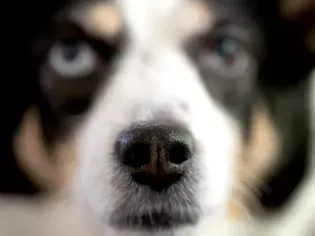Why Are Dog Noses Wet and Cold?
Updated on 04/26/24

Why Are Dog Noses Wet and Cold?
Dogs' noses are fascinating and complex sensory organs that play a vital role in their daily lives. One of the most noticeable characteristics of a dog's nose is that it is often wet and cold. But why is this?
Physiological Reasons
1. Thermoregulation:
Dogs do not sweat like humans do. Instead, they rely on panting and their noses to regulate their body temperature. When a dog pants, moisture evaporates from their tongue and nasal passages, cooling their blood. The wetness of their noses helps facilitate this evaporation process.
2. Scent Detection:
Dogs have an incredible sense of smell, with up to 300 million scent receptors compared to our 6 million. Moisture on their noses helps trap scent particles and dissolve them, allowing dogs to better detect and identify odors.
3. Nasal Mucous Membrane:
The lining of a dog's nose is covered in a moist membrane called the nasal mucous membrane. This membrane secretes a thin layer of mucus that helps trap dust, dirt, and other irritants, preventing them from entering the respiratory tract.
4. Hydration:
Dogs lick their noses to keep them moist. This is especially important in dry environments or during physical activity, as it helps prevent the nasal mucous membrane from drying out.
Behavioral Reasons
1. Communication:
Dogs use their noses to communicate with each other. When a dog licks its nose, it releases pheromones that can convey different messages, such as excitement, submission, or fear.
2. Exploration:
Dogs explore their environment with their noses. The moisture on their noses helps them pick up scents more effectively, allowing them to learn about their surroundings.
3. Affection:
Dogs often lick their owners' faces as a sign of affection. This behavior is likely a remnant of their puppyhood, when they licked their mothers' faces to stimulate milk production.
4. Stress Relief:
Some dogs lick their noses excessively when they are stressed or anxious. This behavior is thought to be a self-soothing mechanism.
Exceptions
Not all dogs have wet noses all the time. In some cases, a dry nose can be a sign of dehydration or an underlying health issue. If you notice that your dog's nose is unusually dry or remains dry for an extended period, it is important to consult with a veterinarian.
Conclusion
Dogs' wet and cold noses are a result of a combination of physiological and behavioral factors. They play a crucial role in thermoregulation, scent detection, hydration, communication, exploration, and affection. Understanding this unique characteristic of dogs can help us appreciate their incredible sensory abilities and bond with them even more.
Explore More Pets

Basic Training
Puppy and Baby Introductions

Working Dog Breeds
All About Search and Rescue Dogs

Dog Treatments
Puppy Vaginitis: Signs, Causes and Treatment

Dog Adoption
After More Than 1,200 Days in the Shelter, Coco Goes Home

Basic Training
How to Train Your Puppy to Go on Potty Pads

Hybrid Dog Breeds
The Difference Between a Mutt, Mixed Breed, or Designer Dog?

Dog Treatments
Nail Problems in Dogs

Puppies
7 Reasons Why Two Dogs Are Better Than One